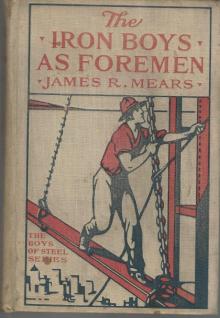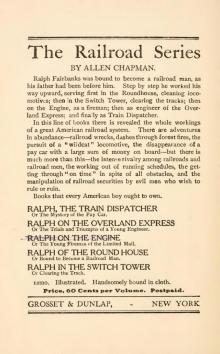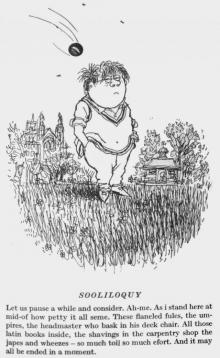- Home
- Mrs. Molesworth
That Girl in Black; and, Bronzie Page 12
That Girl in Black; and, Bronzie Read online
Page 12
it, dear?" he said. "If you do, I--I will swallow_my_ pride, too; shall I?"
She looked up, half laughing now.
"Quits again, you see. Oh, dear, how dreadfully happy I am! And youknow, as you are so fond of work now, you will have _lots_ to do. Allmanner of things for poor people that I want to manage, and don't knowhow--and all our own--I won't say `my' any more--tenants to look after--and--and--"
"`That girl in black' herself to take care of, and make as happy as allmy love and my strength, and my life's devotion can," said Despard."Maisie, my darling; God grant that you may never regret your generosityand goodness."
"No, no," she murmured, "yours are far greater, far, far greater."
There was a moment's silence. Then suddenly Despard put his hand intohis pocket and held out something to Maisie.
"Look," he said, "do you remember? I should have returned it to you,but I could not make up my mind to it. I have never parted with itnight or day, all these years."
It was the little silver vinaigrette.
This all happened several years ago, and, by what I can gather, thereare few happier people than Despard Norreys and Lady Margaret, his wife.
CHAPTER FIVE.
BRONZIE.
It was in church I saw her first. She was seated some little way infront of me, somewhat to one side. My eyes had been roving about, Isuppose, for I was only a boy, fifteen or thereabouts at most, and shewas--let me see--she could not have been more than nine, though by thepose of her head, the dignity of the small figure altogether, theimmaculate demeanour--which said all over her, "I am in church, andbehaving myself accordingly"--one might well have taken her for at leastfive years older.
I remember positively starting when I first caught sight of her--of_it_, I should rather say; for _her_, in the ordinary sense of seeing aperson--that is to say, her face--I never once saw during the whole ofthe first stage of our one-sided acquaintance--the first act of thedrama, so to speak. The "it" was her hair. Never--never before orsince, I do verily believe, has such hair gladdened mortal eyes."Golden" was no word for it, or, rather, was but one of the many wordsit suggested. It was in great floods of waving and wavering shades ofreddish--reddish, not _red_, mind you--brown, dark brown. The mass ofit was certainly dark, though the little golden lights gleamed out allover as you will see the sparkling threads of the precious metal everand anon through the texture of some rich antique silk with which theyare cunningly interwoven. I worried myself to find an adjective in anysense suitable for this marvellous colour, or colours; but it was nouse, and at last, in a sort of despair, I hit upon the very inadequatebut not unsuggestive one of "bronze." It seemed to come a degree nearerit than any other, and it struck me, too, as not commonplace. From"bronze" I went a step further; I found I must have a name for her--asame all my own, that no one would understand even if they heard it;and, half without knowing it, I slipped into calling her to myself, intothinking of my little lady-love as "Bronzie." For I had fallen in lovewith her--looking back now I am sure of it--I had fallen in love withher in the sweet, vague, wholly ridiculous, wholly poetical way that aboy falls in love. And yet I had never seen her face; nay, strangerstill, I did not want to see it!
It was not so at first; for two or three Sundays after the fateful oneon which the glorious hair dazzled me into fairy-land, my one idea wasto catch sight of Bronzie's face. But from where I sat it was all butimpossible; she wore a shady hat, too--a hat with a long ostrich featherdrooping over the left side, which much increased the difficulty. Intime, and with patience, no doubt I should have succeeded; but, as Ihave said, before long the wish to succeed left me. I was only inLondon for my Christmas holidays, and, somehow, I fancied that Bronzie,too, was but a visitor there.
"I shall never see her again," I reflected, with a certain sentimentalenjoyment of the thought; "but I can always think of her. And if herface were not in accordance with her hair and her figure--that dearlittle dignified, erect figure--what a disappointment! If she had anugly mouth, or if she squinted, or even if she were just commonplace andexpressionless--no, I don't want to see her."
Accident favoured me; all those Sundays, as I have said, I never did seeher face. The church was crowded; we made our exit by different aisles,and, as I was staying with cousins who were never in time for anything,we always came in late--later than Bronzie, any way. The little figure,the radiant hair, were always there in the same corner for my eyes torest upon from the moment I ensconced myself in my place. And so it wasto the end of the holidays--somewhat longer that year than usual, fromillness of an infectious nature, having broken out among the brothersand sisters at my home.
I went back to school, to Latin verses and football, to the mingled workand play which make up the intense _present_ of a boy's life; I was, toall appearance, just the same as before, and yet I was changed. I nevertalked about my Bronzie to any one, I made up no dreams about her, builtno castles in the air of ever seeing her again, and yet I never forgother. No, truly, strange and almost incredible as it may seem, I neverdid forget her; I feel almost certain there was no day in which theremembrance of her did not flash across my mental vision.
It was three years later. School-days were over--so recently over thatI had scarcely realised the fact, not, certainly, to the extent offeeling sad or pathetic about it--such regrets come afterwards, and cometo stay; my feeling was rather one of rejoicing in my new liberty, andpride in being considered man enough to escort an elder sister on asomewhat distant journey had effectually put everything else out of myhead that Christmas-time--it was always at Christmas-time--when--I saw_her_ again. We were at a railway station, a junction; our throughcarriage was being shunted and bumped about in the mysterious waypeculiar to those privileged vehicles. We had been "sided" into a partof the station different from that where we had arrived; I was leaningout, staring about me, when suddenly, some little way off, there gleamedupon me for a moment the glow of that wonderful hair. The platform wascrowded; Bronzie was walking away in an opposite direction, thoughslowly. She was with two ladies; as usual, it was only the hair andfigure I saw--no glimpse of the face was possible; yet I knew it wasshe. Nor, of course, would the sight of a face I never had seen havehelped to identify her.
"By Jove!" I exclaimed aloud, unconscious that my sister was closebehind me; "by Jove! how she has grown!"
"Who?" Isabel exclaimed; "whom are you speaking of? Is there some onethere we know?" and in another instant she too was craning her neck outof the window. "I don't see any one," she added, withdrawing her head,in disappointment. "Who was it, Vic?"
I think I had turned pale; I felt myself now grow crimson.
"Oh!" I blurted out, saying, of course, in my confusion exactly what Iwould _not_ have said: "only a--a little girl with such wonderful hair."
"Where?" asked Isabel, again poking her head out--in the wrongdirection, of course; she was tired of the long waiting, and jumped atthe smallest excitement. "Oh, yes! I see! at the door of therefreshment, room. Yes, it _is_ magnificent hair; but, Vic, you said--"
"Nonsense!" I interrupted, "she's nowhere near the refreshment room;it's not possible it's the same."
Nor was it. Bronzie was by this time out of sight, far off among thethrong of travellers at the left extremity of the platform, and therefreshment room was some yards to our right. It was absolutely,practically impossible. "Nonsense!" I repeated peevishly, looking out,nevertheless, in expectation of seeing some childish head of ordinaryfair hair at the spot my sister indicated. But I started violently--yes, it _was_ Bronzie again; the self-same hair, at least. And the girlwas standing, with her back to us, at the door of the first-classrefreshment room, as Isabel had said. I felt as if I were dreaming; mybrain was in a whirl. I sat down in my place for a moment to recovermyself.
"I wonder," said my sister, "if her face is as lovely as her hair? Sheis sure to turn round directly. Wait a minute, Vic, I'll tell you ifshe oh, how tiresome! I do believe we are off; after waiting so
long,they might as well have waited one moment longer."
And off we were--in the opposite direction too. We could see no more ofher--Bronzie, or not Bronzie! On the whole I was not sorry that mysister's curiosity was doomed to be unsatisfied. But my own perplexitywas great. How _could_ the child have been spirited all the length ofthe station in that instant of time?
"She is a fairy; that is the only explanation," I said to myself,laughingly. "Perhaps I have dreamt her only--in church, that Christmastoo--but no; Isabel saw the hair as well as I."
Time went on, faster and faster. I was a man--very thoroughly a man--for seven years had passed since that winter day's

 The Iron Boys as Foremen; or, Heading the Diamond Drill Shift
The Iron Boys as Foremen; or, Heading the Diamond Drill Shift An Enchanted Garden: Fairy Stories
An Enchanted Garden: Fairy Stories Grandmother Dear: A Book for Boys and Girls
Grandmother Dear: A Book for Boys and Girls Ralph, the Train Dispatcher; Or, The Mystery of the Pay Car
Ralph, the Train Dispatcher; Or, The Mystery of the Pay Car The Children of the Castle
The Children of the Castle The Magic Nuts
The Magic Nuts Uncanny Tales
Uncanny Tales Silverthorns
Silverthorns The Third Miss St Quentin
The Third Miss St Quentin Christmas-Tree Land
Christmas-Tree Land Philippa
Philippa Jasper
Jasper The Little Old Portrait
The Little Old Portrait Mary: A Nursery Story for Very Little Children
Mary: A Nursery Story for Very Little Children Us, An Old Fashioned Story
Us, An Old Fashioned Story The Constant Prince
The Constant Prince Blanche: A Story for Girls
Blanche: A Story for Girls The Cuckoo Clock
The Cuckoo Clock The Carved Lions
The Carved Lions Tell Me a Story
Tell Me a Story That Girl in Black; and, Bronzie
That Girl in Black; and, Bronzie Sweet Content
Sweet Content Boys and I: A Child's Story for Children
Boys and I: A Child's Story for Children The Man with the Pan-Pipes, and Other Stories
The Man with the Pan-Pipes, and Other Stories Bert Wilson's Fadeaway Ball
Bert Wilson's Fadeaway Ball Nurse Heatherdale's Story
Nurse Heatherdale's Story Adventures of Herr Baby
Adventures of Herr Baby Shaggycoat: The Biography of a Beaver
Shaggycoat: The Biography of a Beaver Adventures of Prince Lazybones, and Other Stories
Adventures of Prince Lazybones, and Other Stories Adventures of Piang the Moro Jungle Boy
Adventures of Piang the Moro Jungle Boy